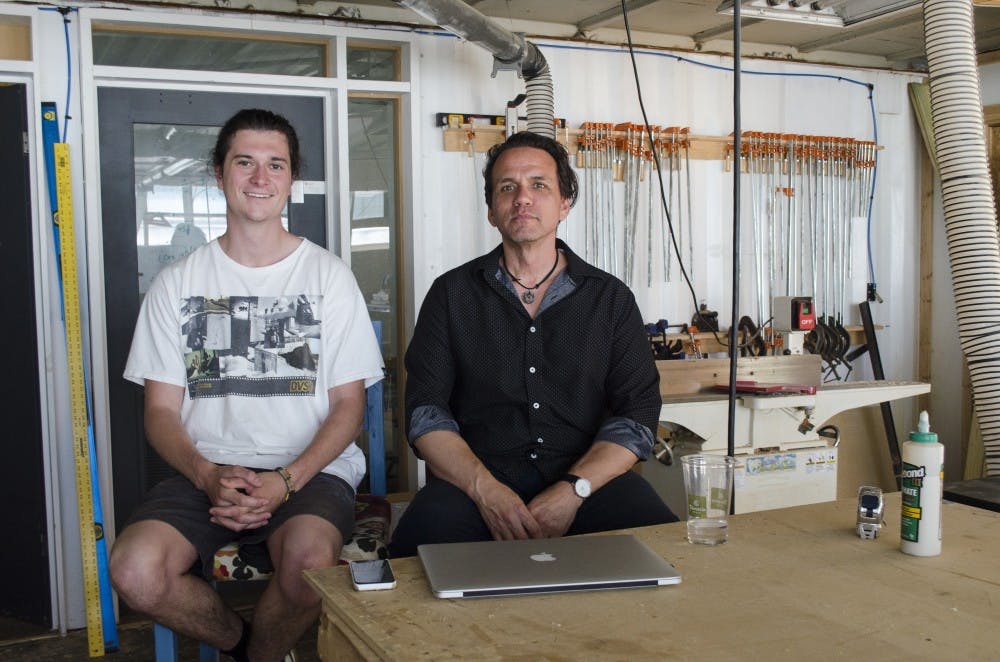In 2014, 39.8 million United States households, more than a third of all, were housing cost-burdened, according to the Harvard University Joint Center for Housing Studies. The U.S. Conference of Mayors has cited affordable housing as the leading cause of homelessness.
To raise awareness for this issue, after graduation senior Jack Pasi will hit the road with his girlfriend Charolotte Robin in a 48-square-foot tiny home on an 11,000 mile cross-country journey towed by 2005 Honda Pilot in a project called “Coast to Coast, Cote a Cote.”
“I wanted to connect it to a larger cause bigger than myself, and what better way to spread awareness about affordable housing than doing this?” Pasi said.
The tiny home, called MOBii, was created with refurbished materials from Elon University, has all the functions of a regular home and cost only around $3,000 with little waste in the construction — a possible solution to the affordable housing problem.

The idea came from the course “Humans and Nature in Spring 2015” when Robert Charest, associate professor of environmental studies, asked students to come up with a with a space containing of the functions of a home with the smallest footprint possible.
“A lot of students helped build it, not just me,” Pasi said. “It was pretty much Robert’s idea, just teaching the students how to build stuff, and I don’t know, I guess I was dumb enough to say I want to take it on the road.”
The small space includes a loft above a built-in table and chairs, sink, counter, wet bath and some storage — just enough space to live in for a few months. Additionally, Pasi plans to construct a deck and a hutch with a solar panel for off-grid energy before they take off in June.
“We’re trying to be as frugal as possible,” he said. “I haven’t really thought about what I’m bringing yet. I guess just the bare essentials.”
Pasi and Robin’s journey to 30 cities will begin June 19, starting from his hometown of Exeter, New Hampshire. From there the two will travel down the East Coast, stopping in places such as New York City and Washington, D.C. before reaching Florida.
From there they will head west to Southern California, up to San Francisco, trek to North Dakota before heading down south to Missouri and Tennessee until they reach their final destination of Chapel Hill.
While on the road, Pasi plans to keep a blog on his website, CoasttoCote.weebly.com, to record his experiences as well as reach out to various media organizations to spread more awareness on the affordable housing issue.
“We would meet people organically — just stopping in the streets people are going to go up and talk to you,” Pasi said. “I feel like the homeless people don’t have the means to build all of this. So I feel like you need to reach out to the larger community who’s more willing to help other people.”
Though Charest does not believe that incredibly small houses gave the absolute solution to the affordable housing problem, he does think it is a step in the right direction for building awareness and smaller ecological footprints.“I’m very happy and proud of him to have come up with a broader perspective other than just building tiny,” Charest said. “Everyone’s building tiny, but this has a social component to it.”

Instead, he believes that affordable tiny house community model that complies with building codes and zoning ordinances, such as the one he is working on in northern Burlington, would be better suited for addressing affordable housing.
“I think that has a better chance to impact more people,” Charest said. “These one-offs we do are interesting laboratories to see how we can just live in small footprints, but I don’t think they are the solution to affordable housing.”
So far, Pasi has spent two nights sleeping in MOBii when he presented the tiny home at the 2017 Tiny House NC Street Festival in Pink Hill. Though it was it bit crammed, Pasi said it was manageable — but it might be tight with two people.
At the festival, MOBii created quite the buzz due to its small size. Attendees asked if they could purchase building plans or wanted to know where they can buy one.
Pasi hopes this kind of excitement and interest will continue when he begins the actual journey.
“I guess there’s no real tangible goal, it’s more of a continual aim,” he said. “Obviously this isn’t going to solve the affordable housing crisis but it’s spread more awareness — trying to do the most good you can. It’s better than nothing.”


